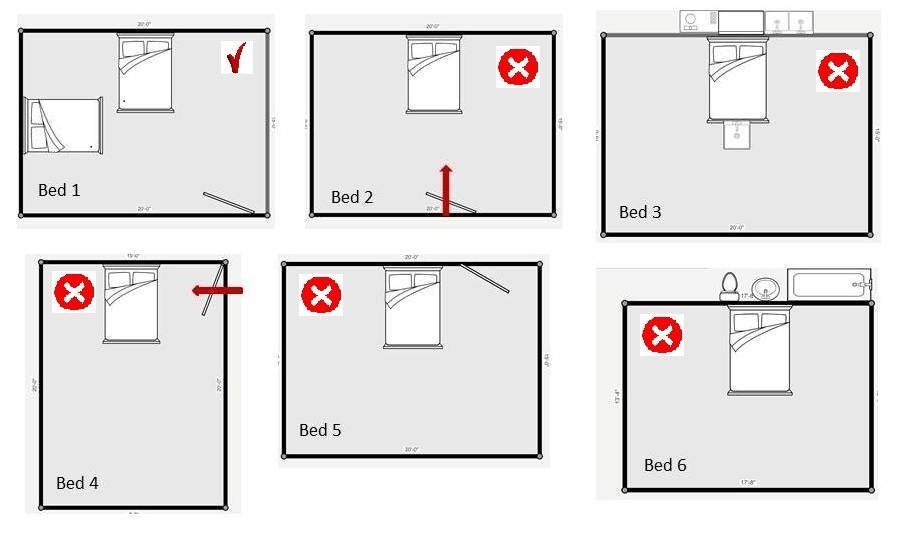The Subtle Art of Placement: Feng Shui Mirrors in the Bedroom
Imagine stepping into your bedroom, a sanctuary designed not just for physical rest, but also for the subtle energies that shape our lives. Feng shui, the ancient Chinese art of harmonizing individuals with their surroundings, offers profound insights into creating spaces that nurture well-being. Among its many tools, the mirror holds a unique power, capable of reflecting, amplifying, and redirecting energy. But how can we harness this power wisely within the intimate space of the bedroom?
The placement of a feng shui mirror in the bedroom is far from arbitrary. It's a delicate dance between intention and observation, a conversation between the seen and the unseen. Mirrors, in feng shui, are not mere decorative objects; they are dynamic instruments that interact with the chi, or life force, flowing through our homes. Understanding this interaction is key to creating a bedroom environment that truly supports restorative sleep and overall well-being.
Feng shui, literally translated as "wind-water," has its roots in ancient Chinese philosophy, a system of thought deeply connected to the natural world. Over centuries, practitioners observed the flow of energy in nature and developed principles for creating harmonious environments. Mirrors, with their reflective properties, became symbolic of water, an element associated with flow, abundance, and clarity. In the context of the bedroom, the reflective quality of mirrors allows for the manipulation and enhancement of chi, creating a space that promotes balance and tranquility.
The core issue with mirrors in feng shui bedrooms often revolves around their potential to disrupt sleep. Mirrors can amplify energy, which, while beneficial in some areas of the home, can be counterproductive in a space designed for rest. Reflecting the bed, for instance, is generally discouraged as it can lead to restlessness and amplify anxieties. The key lies in understanding the specific areas of the bedroom where mirrors can be beneficial and where they should be avoided.
Strategic mirror placement in a bedroom, according to feng shui principles, can bring several benefits. Reflecting a beautiful view from a window can bring the outdoors in, creating a sense of spaciousness and connection with nature. Placing a mirror on the inside of a closet door can symbolically double your wardrobe, representing abundance and prosperity. Carefully positioned mirrors can also help balance the energy of the room by reflecting light and creating a sense of flow.
A practical approach to implementing feng shui mirror principles in your bedroom involves careful observation and intention. Begin by assessing the current layout of your room. Where are the windows? What is the view from your bed? Where does light enter the room? These are crucial considerations when deciding where to place a mirror. Avoid placing mirrors directly opposite the bed or reflecting cluttered areas. Instead, consider placing a mirror to reflect a pleasant view, a beautiful piece of art, or a well-maintained plant.
Advantages and Disadvantages of Feng Shui Mirrors in the Bedroom
| Advantages | Disadvantages |
|---|---|
| Enhance natural light | Can disrupt sleep if placed incorrectly |
| Create a sense of spaciousness | May amplify negative energy if reflecting clutter |
| Balance energy flow | Can create a sense of unease if reflecting the bed |
Best Practices for Feng Shui Mirrors in Bedrooms
1. Avoid reflecting the bed: This can lead to insomnia and restless sleep.
2. Reflect positive imagery: Choose to reflect pleasant views, artwork, or inspiring objects.
3. Use mirrors to enhance natural light: Reflecting sunlight can brighten and energize a space (but not towards the bed).
4. Be mindful of size and shape: Large mirrors can overpower a space, while smaller, strategically placed mirrors can be more effective.
5. Keep mirrors clean and clear: A dusty or smudged mirror can stagnate energy.
Frequently Asked Questions
1. Can I have any mirrors in my bedroom according to feng shui? Yes, but placement is key.
2. What should I do if my bedroom has mirrored closet doors? Consider covering them at night with curtains or fabric.
3. Is it okay to have a small mirror on my dresser? Yes, as long as it doesn't reflect the bed.
4. Can a mirror reflect the bathroom door? It's generally best to avoid this.
5. What if my bedroom is small? Choose smaller mirrors and place them strategically to enhance light and create a sense of spaciousness.
6. Can I hang a mirror above my bed? This is not recommended in feng shui.
7. Should I consult a feng shui expert? If you have complex layout challenges, a consultation can be beneficial.
8. Can I use mirrored furniture in my bedroom? Use it sparingly and be mindful of reflections.
In conclusion, the placement of a feng shui mirror in the bedroom is a powerful tool for enhancing the energy of your personal sanctuary. By understanding the principles of chi flow and applying them thoughtfully, you can create a space that supports restful sleep, promotes well-being, and fosters a sense of harmony. While the nuances of feng shui can be complex, the core principle remains simple: be mindful of the energy you invite into your space. Observe, experiment, and create a bedroom environment that truly reflects your inner peace and supports your journey toward a more balanced and fulfilling life. Begin by assessing your current bedroom layout and consider the reflections created by existing mirrors. Take action by repositioning or removing mirrors that reflect the bed or cluttered areas. Embrace the opportunity to cultivate a more harmonious and restful space, one reflection at a time.
Unlocking the potential of behr light granite paint
Unlocking the game journey through video ball reviews
The enduring appeal of a pre owned toyota sequoia trd pro










